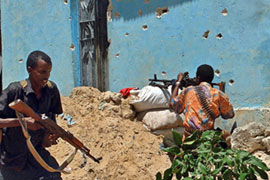Somalis die in Ethiopian shelling
Tank shell hits crowd, a day after bodies of Ethiopian soldiers are paraded.

Published On 9 Nov 2007
On Thursday, the bodies of Ethiopian soldiers killed in clashes were dragged through the streets and pelted with stones.
Protesters, mainly women and children, chanted “God is great!” and “death is for the invaders and their stooges”.
Witnesses said at least seven Ethiopian soldiers were killed during battles in the Sqa Holaha neighbourhood in northern Mogadishu.
Resentment
“I saw seven dead Ethiopian soldiers and 11 Somalis who were killed in fighting, and many more people who were wounded and not taken to the hospital because it was too dark,” resident Omar Ahmed told Reuters.
At Mogadishu’s main hospital Madina, medical officer Dahir Dheere said doctors had treated more than 20 wounded people.
Ethiopian corpses were also dragged through Mogadishu in March.
Many ordinary Somalis and fighters drawn mainly from the Islamic Courts movement that ruled Mogadishu briefly last year resent the presence of the Ethiopian troops and often carry out violent protests against them.
Hundreds of residents had burned tyres and poured on to the streets of southern Mogadishu on Wednesday to protest against the Ethiopians, who helped the weak Somali government seize the lawless capital last year and are essential to retaining control.
Humanitarian crisis
Fighting in Mogadishu this year has sent hundreds of thousands fleeing the city and the latest outbreak of fighting caused thousands more to leave.
Aid delivery has been made next to impossible.
In the south-central town of Baidoa, where the Somali parliament still sits, the United Nations country head urged legislators on Thursday to move quickly to stem the humanitarian crisis.
“I want to be clear here today that 1.5 million Somalis are in need of emergency aid. And the number of people that have been displaced goes up 850,000,” Eric Laroche, the UN humanitarian co-ordinator for Somalia, told parliament.
 |
| Fighting in Mogadishu this year has sent hundreds of thousands fleeing [AFP] |
“We have to be able to help them and we have a problem reaching them.”
Parliament’s main order of business will be approving a new prime minister to succeed Ali Mohamed Gedi, who resigned last week after a feud with the president, Abdullahi Yusuf.
Yusuf told parliament, which has approved a legal change allowing non-legislators to serve as prime minister and cabinet ministers, that he would work quickly to find a replacement.
Diplomats say the legal change has widened the pool of qualified leaders from beyond the parliament – which counts among its members many militia commanders and clan leaders – and may lead to qualified candidates from the Somali diaspora being brought in.
The feud between Yusuf and Gedi has stalled progress by the government, the 14th attempt at imposing central rule since the 1991 overthrow of Mohamed Siad Barre plunged the Horn of Africa country into anarchy.
Source: News Agencies